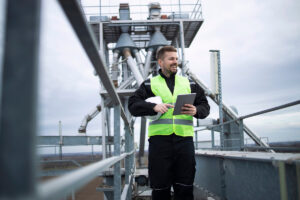AI in workflow automation is going to transform the construction industry by automating procedures, lowering human error, and enhancing efficiency. building organizations may better manage resources, minimize project delays, and save money by integrating AI-powered solutions into workflow automation as building projects become more complicated. By evaluating enormous volumes of data in real time, AI in workflow automation improves decision-making and optimizes everything from supply chain management in construction to project timetables.
For example, AI-powered automated scheduling can anticipate delays brought on by bad weather or a manpower shortage and modify project plans appropriately. Construction companies are benefiting from this shift to AI in workflow automation, which helps them increase production while upholding stricter safety and regulatory requirements. The construction sector will be greatly impacted by the widespread adoption of these technologies, which will spur innovation and establish new benchmarks for efficiency in 2024 and beyond.
Table of Contents
The Role of AI in Workflow Automation for Construction
The use of AI in workflow automation is changing construction operations in 2024. AI-powered solutions enhance productivity, accuracy, and project management in general by automating repetitive operations and analyzing large datasets. This change has proven to be vital in a sector infamous for delays and cost overruns, assisting construction businesses in more efficiently meeting budgets and timelines.
The Main Advantages of AI in Workflow Automation for Construction:
- Enhanced Productivity: AI-driven solutions expedite the completion of monotonous jobs, freeing up human labor for more sophisticated activities.
- Improved Decision-making: AI examines real-time project data, enabling more accurate decisions.
- Quicker Project Delivery: Automated workflows simplify processes, reducing delays.
- Savings: Automation lowers labor expenses and helps guard against costly mistakes.

1. AI in Workflow Automation for Design and Planning
Architects and engineers can produce more accurate and effective designs during the design and planning stages by using AI in workflow automation. They can also incorporate real-time input to optimize construction plans.
1. AI in Building Information Modeling (BIM): AI-powered Building Information Modeling (BIM) platforms facilitate teamwork in design, construction, and operations planning.
- Real-time Updates: As construction moves forward, AI-enabled BIM updates the plans to guarantee that the design and the actual build are in sync.
- Cooperation: By allowing several parties to work on the same model at once, communication and decision-making are enhanced.
2. AI-Powered Design Automation: Artificial intelligence (AI) solutions can reduce the time needed for manual design iterations by generating multiple design options based on specific project characteristics.
- Design Optimization: AI determines the best design options by examining sustainability and material strength.
- Faster Iterations: The requirement for back-and-forth between architects and engineers is decreased by automated design tools.
2. Artificial Intelligence in Procurement and Supply Chain Management Workflow Automation
Successful supply chain management and procurement are essential for the construction industry. By managing vendor relationships, forecasting supply chain interruptions, and optimizing inventories, artificial intelligence AI in workflow automation streamlines these procedures.
1. AI in Supply Chain Optimization: AI assists in anticipating disturbances in the supply chain and maximizing resource allocation to avoid shortages of materials or project delays.
- Predictive Analytics: AI examines data from the global supply chain to identify possible interruptions and lets managers modify orders or schedules accordingly.
- Inventory Management: AI-powered systems maximize inventory levels, guaranteeing materials can be found when needed without overstocking.
2. Artificial Intelligence in Procurement Automation: AI can reduce manual intervention and increase accuracy by automating the whole procurement process, from vendor selection to order fulfillment.
- Vendor Management: AI-powered systems choose the top suppliers based on past performance, cost, and material quality.
- Order Tracking: Automatic procedures monitor orders from placement to delivery, guaranteeing that supplies reach their destination on schedule.

3. Artificial Intelligence in Project Management
In construction, project management is one of the most important fields benefiting from AI in workflow automation. Workflows can be made more efficient by using AI to automate risk management, resource allocation, and project scheduling.
1. AI in Risk Management and Mitigation: By identifying possible risks early in the project lifecycle, AI-driven risk management solutions help construction companies prevent expensive mistakes or delays.
- Predictive Analytics: AI uses past project data analysis to forecast hazards like delays or cost overruns.
Automated Alerts: To ensure prompt interventions, the technology notifies project managers in real time about new dangers.
2. AI for Project Scheduling in Automated: Project schedules can be automatically modified by AI using real-time data on things like worker productivity, equipment availability, and weather variations.
- Dynamic Scheduling: AI systems instantly modify schedules in response to changing project circumstances.
- Real-time Updates: By informing managers and employees of changes, delays are minimized.
4. AI in Construction Monitoring and Site Management
Construction site management and real-time monitoring depend heavily on AI in workflow automation. By analyzing massive datasets gathered from cameras, drones, and Internet of Things sensors, these systems enable more effective site management.
1. AI in Safety and Compliance Management: Artificial intelligence-powered safety solutions keep an eye on building sites in real time, warning management of any safety infractions and assisting businesses in adhering to rules.
- Hazard detection: By identifying risky actions or circumstances, AI-powered cameras help lower the chance of mishaps.
- Tracking compliance: Automated methods make sure that local safety and building codes are followed.
2. AI-Powered Monitoring of Construction Sites: Artificial intelligence (AI) tools keep an eye on site activities and make sure that all operations follow safety procedures and project objectives.
- Real-time Surveillance: To identify possible safety risks, AI examines video feeds from security cameras and drones.
- Automated Reporting: artificial intelligence (AI) tools automatically generate reports on site conditions, workforce productivity, and utilization of materials.
Suggested article to read: From Blueprint to Reality: AI in Construction Planning and Design (2024 Guide)

5. Overcoming Obstacles in Construction Workflow Automation with AI
While AI in workflow automation offers major advantages, implementing it comes with challenges such as costly upfront expenses, integration with legacy systems, and the need for employee training.
1. Combining Legacy Systems with Integration: A lot of construction firms use outdated technologies, which might not work with AI-powered equipment.
- System Updates: Businesses may need to make investments in updating their current systems in order to fully benefit from AI.
- Custom Integrations: To guarantee seamless transitions, AI solutions should be customized to operate with older systems.
2. Education and Transition Planning: Introducing AI in workflow automation needs employee education and control of resistance to novel technologies.
- Programs for Training: Providing thorough training guarantees that staff members can use AI products efficiently.
- Change Management: Sharing the advantages of AI, like less effort and more effectiveness, helps facilitate changes.
3. High starting prices: Workflow automation solutions powered by AI demand a large initial hardware and software investment.
- ROI considerations: Long-term labor savings and a decrease in errors frequently outweigh the high initial cost.
- Scalability: Costs can be managed by beginning small and gradually increasing automation efforts.
Future Trends in AI in Workflow Automation for Construction
The future of AI in workflow automation in construction is optimistic, with improvements in robotics, machine learning, and data analytics anticipated to have an important part.
1. Machine Learning for Predictive Maintenance
Predictive maintenance of equipment will be made possible by machine learning in construction algorithms, reducing repair costs and downtime.
- Real-time Diagnostics: AI systems will track the condition of the machinery and anticipate malfunctions before they happen.
- Savings: Preventive maintenance lowers the likelihood of unplanned equipment breakdowns, increasing productivity and lowering expenses.
2. Data-Informed Decision Making
AI-driven data analytics will be used more and more, enabling construction companies to make more informed decisions.
- Predictive Analytics: AI will forecast project results based on past data, giving managers the opportunity to proactively handle possible problems.
- Optimized Resource Allocation: Artificial intelligence (AI) tools will examine data to better distribute resources, resulting in shorter project completion times and lower expenses.
3. Robotics and AI
Complex activities like pouring concrete, cutting steel, and building bricks will be further automated by combining construction robotics and artificial intelligence.
- Autonomous Machines: As AI-powered robots take on additional responsibilities, construction efficiency and accuracy will increase.
- Enhanced Safety: By handling risky jobs, robotic automation will also lower the chance of accidents.

Conclusion
By 2024, the construction industry’s adoption of AI in workflow automation will have completely changed how projects are handled and carried out. Artificial Intelligence (AI) enables construction organizations to enhance efficiency and reduce costly errors by automating repetitive processes and delivering real-time data analysis. The examples given in this article show how integrating AI into workflow automation helps companies meet deadlines, better allocate resources, and maintain regulatory compliance.
These advantages result in major cost savings and quicker project completion schedules, both of which have a positive effect on a business’s bottom line. The future of construction will be significantly shaped by the ongoing advancement of AI in workflow automation, therefore in order for businesses to stay competitive, they must invest in and adopt these technologies.
FAQs
How does AI in Workflow Automation Improve Project Management in Construction?
- Answer: By automating scheduling, risk management, and resource allocation, artificial intelligence enhances project management. Project timetables are constantly adjusted, risks are predicted, and real-time updates are provided; all of these features facilitate more effective project execution and prompt decision-making.
What are the Key Benefits of Using AI in Workflow Automation for Construction Design and Planning?
- Answer: By automating design iterations, generating optimal design solutions fast, and integrating with Building Information Modeling (BIM) systems, artificial intelligence (AI) improves design and planning. As a result, designs are more precise, modifications happen more quickly, and stakeholders work together better.
How does AI Contribute to Construction Site Monitoring and Safety?
- Answer: By evaluating data from cameras and drones to identify risks and guarantee adherence to safety procedures, artificial intelligence (AI) enhances site monitoring and safety. In order to improve overall site management and prevent accidents, it offers automated safety alerts and real-time surveillance.
In what Ways does AI Enhance Procurement and Supply Chain Management in Construction?
- Answer: By automating vendor selection, tracking orders, and forecasting supply chain interruptions, artificial intelligence (AI) improves procurement and supply chain management. This leads to better resource allocation, timely material deliveries, and streamlined inventory management.
What Future Trends are Expected in AI in Workflow Automation for the Construction Industry?
- Answer: Future developments will likely see a rise in the usage of robotics for intricate building jobs, machine learning-driven predictive maintenance, and increasingly sophisticated data-driven decision-making. These advancements hold the potential to further improve construction projects’ cost-effectiveness, efficiency, and safety.
Suggested article for reading:
Top 8 AI in Project Management Case Studies (2024)
Workflow Automation in Construction, The Ultimate Guide for 2024
Case Study: Top 4 Eco-Friendly Smart Building Construction Projects
Future of Smart Building Construction: 7 Trends to Watch
Beyond BIM: Integrating AI for Enhanced Construction Management (2024)
Resources:
McKinsey | Construction Dive | Deloitte | Forbes
For all the pictures: Freepik





